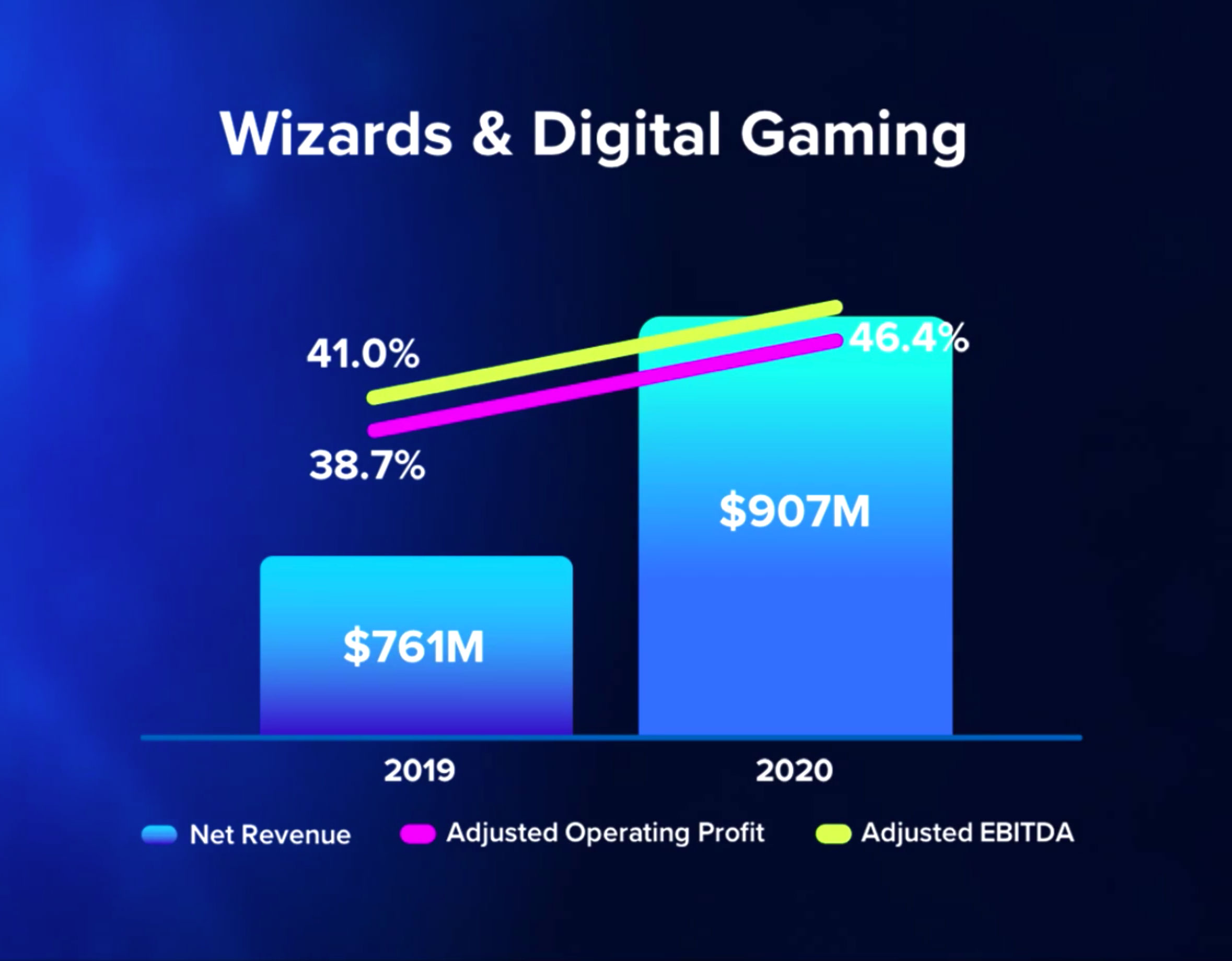Wizards of the Coast is set to become one of three new divisions of Hasbro—with a new logo and refreshed website to mark its new status. Hasbro acquired the company in 1999 and had run it as a subsidiary (a separate legal entity) for the last 22 years.
At a packed 2021 Investor Event, Hasbro announced that they were reorganizing their company into three divisions: Consumer Products, Entertainment, and “Wizards of the Coast and Digital Gaming.” The Consumer Products division will be handle Hasbro’s traditional toys and games, while the Entertainment division will be responsible for the company’s film and television content. Wizards of the Coast’s new division will continue to make Wizards’ existing games, like Magic: the Gathering and Dungeons and Dragons, lead an “aggressive digital transformation” of those games, and license Hasbro’s gaming IP for other digital products.
The transition of Wizards into a division of Hasbro comes after Wizards booked a record-setting 2020. In fact, last year was Wizards’ best year ever in which they generated $816 million in revenue—a 23% year over year increase from 2019, CEO Chris Cocks revealed in his segment of the Investor Event. “This was lead by record-breaking years for Magic, up 23%, and D&D, up 33%,” Cocks said. “Our Hasbro digital licensing business grew 17% year of year, and combined with Wizards, the segment totaled $907 million in revenue last year.”

Combined revenue from the new Wizards of the Coast and Digital Gaming division.
Wizards has experienced a decade of growth that saw their annual profits grow 400%. The company doubled in size in the five years between 2012 to 2017, and Hasbro’s CEO Brian Goldner said today that Wizards was on track to double once again in the following five year period from 2018 to 2023.
The Five Engines of Growth for the New Wizards of the Coast
Cocks explained that the growth of the new Wizards of the Coast and Digital Gaming division will be powered by five engines: tabletop innovation with Magic and D&D, digital versions of Magic and D&D, a new IP pipeline, new sales channels, and digital licensing.
Tabletop and Digital Magic and D&D
The first engine—tabletop versions of Magic and D&D—is pretty well understood. But Cocks proved that Wizards intends to continue to innovate with their existing games when he revealed the new Universes Beyond product series that will see Magic crossovers featuring Warhammer 40k and Lord of the Rings. They are also increasing the annual number of premiere sets from five to six in 2021, with the expected January Winter 2022 set moving into November or December of 2021, and it seems like that increased cadence will continue into 2022.
The plans for the digital versions of those games are also well known and include the continued expansion of Magic Arena onto mobile devices with the official launch of both the Android and iOS clients in the second quarter of this year, as well as the D&D action RPG Dark Alliance scheduled for later this year.
New IP
For the third engine, Cocks said that Wizards is “building a robust new IP pipeline, hiring key talent from Ubisoft, BioWare, Warner Brothers, and Disney, to explore fantasy-adjacent genres like sci-fi, action, horror, and collectibles.”
Wizards is “looking toward our next big tentpole franchises, he continued. “Over the next five years, we expect to launch several successful new brands by focusing on what defines our success today, namely, fantasy-adjacent genres to appeal to the lifestyle gamer, like sci-fi and horror, with games that offer deep world building and a consistent drumbeat of content that supports long-term engagement punctuated by epic play DNA that crosses borders and generations.”
New Sales Channels
The fourth engine, and likely the most controversial for enfranchised Magic players, will be built on exploring new channels through which Wizards can sell its products.
“We’re going beyond our 7,000 hobby retail stores,” Cocks said, “and expanding underdeveloped retail channels like direct-to-consumer, e-commerce, and mass-market on a global scale.”
Though Cocks reiterated that “our tabletop games are … supported by a network of retail stores to create unique face-to-face play experiences” for the Magic player base, it has been clear for years that Wizards wants to expand its ability to sell its product directly to consumers. They began selling sealed product on Amazon in 2018 and have spent the better part of the last year and a half selling promos directly to players via the Secret Lair Drop Series.
It’s unclear how much Wizards intends to change their relationship with local games stores as a part of this “engine,” but they did confirm that their upcoming Universes Beyond Magic crossover products will (mostly) be available at brick and mortar retailers.
UPDATE: Wizards head of communications, Bruce Dugan, reached out with a clarification about Cocks’s statements this morning:
To clarify a misconception about a statement from this morning’s investor event, Chris Cocks stated “our tabletop games are constantly innovating and are supported by a network of retail stores to create unique face-to-face play experiences.” Later in the presentation he said “we are going beyond our over seven thousand hobby retail stores and expanding underdeveloped retail channels like DTC [direct-to-consumer], ecommerce and mass market globally.” In that second quote, the word beyond is not meant to imply a transition away from the WPN, but an expansion of our other channels happening simultaneously. We continue to support the growth of the Wizards Play Network.
Digital Licensing
The final engine represents the expansion of Wizards’ responsibilities within Hasbro. Wizards is now responsible for the licensing the entirety of Hasbro’s deep roster of intellectual properties for digital gaming.

